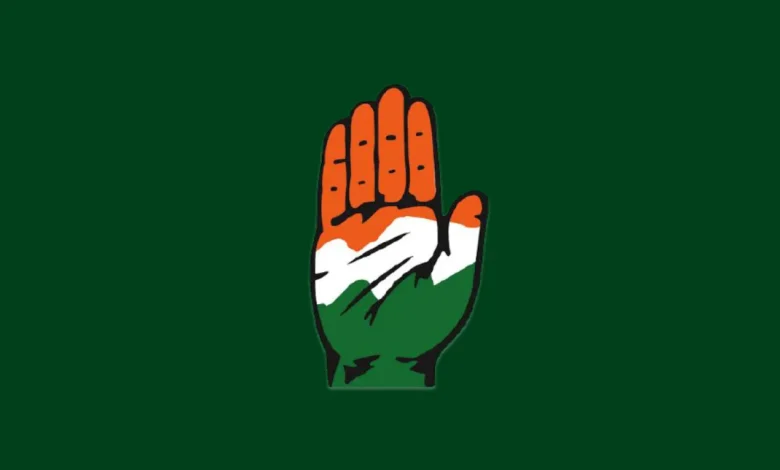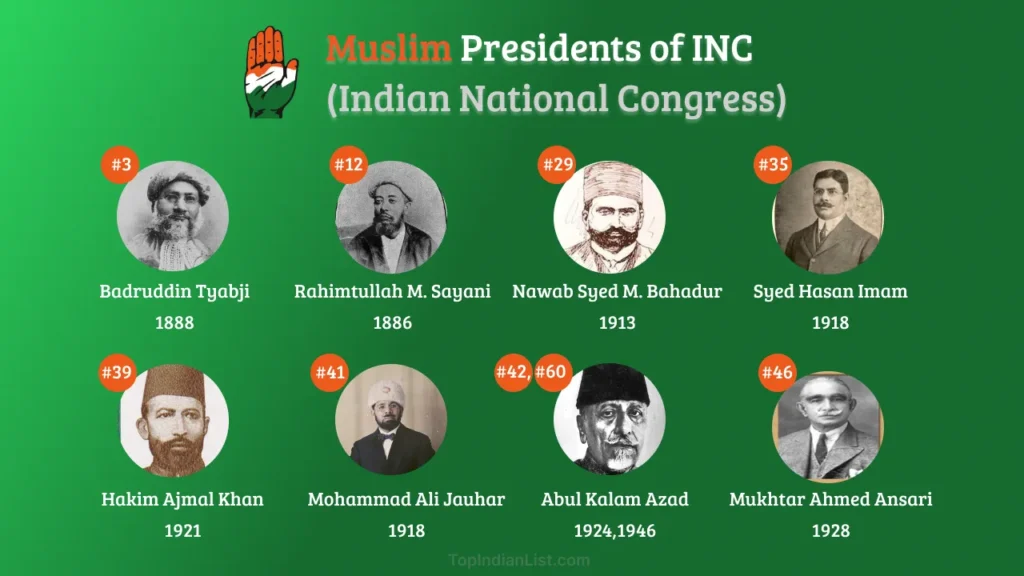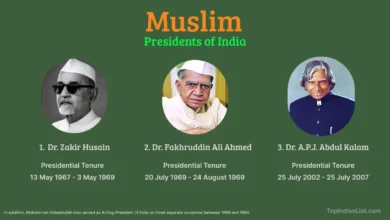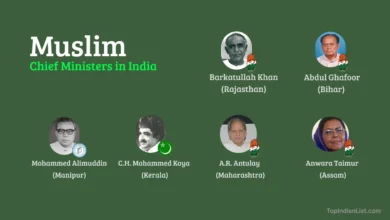List of All Muslim Presidents of Indian National Congress

The Indian National Congress, a major political party in India known for its liberal and secular values, was established in 1885. From 1885 to 1933, the party had a policy of one-year terms for its presidents. However, this rule was abolished in 1933. Interestingly, from 1978 to 2004, the roles of Prime Minister and Congress Party President were often held by the same individual, including Indira Gandhi, Rajiv Gandhi, and P.V. Narasimha Rao. However, this trend ended in 2004 when Manmohan Singh became Prime Minister but did not assume the position of Congress Party President.
Currently, Mallikarjun Kharge is serving as the 98th President of the Indian National Congress, a position he has held since October 2022. Kharge won the election, defeating Shashi Tharoor. It is worth noting that out of the 98 individuals who have served as Congress Party President, eight of them were from the Muslim community, all of whom were elected during the pre-independence era. Since India’s independence, the Congress Party has not had a Muslim President.
Below is the name, tenure and other key details of all 8 muslim presidents of Indian National Congress.
List of all Muslim Presidents of Indian National Congress(INC):

1. Badruddin Tyabji
- INC President Tenure: 1887 – 1888
- Born and Death: 10 October 1844 – 19 August 1906 (Aged 61)
Badruddin Tyabji served as the first Muslim President of the Indian National Congress, holding the position from 1887 to 1888. Tyabji was born into a prominent family, being the son of Mullah Tyab Ali Bhai Mian, a member of the Sulaimani Bohra community and a descendant of an old Arab Cambay emigrant family.
In 1895, Tyabji was appointed as a judge of the Bombay High Court, becoming the first Muslim and third Indian to hold this esteemed position. His career progressed further in 1902 when he became the first Indian to serve as Chief Justice of the Bombay High Court.
Tragically, while on a leave in London, England in 1906, Tyabji passed away suddenly from a heart attack.
2. Rahimtullah M. Sayani
- INC President Tenure: 1886(1 Year)
- Born and Death: 5 April 1847 – 6 June 1902 (Aged 61)
Rahimtullah M. Sayani served as the second Muslim President of the Indian National Congress. He began his public life as an elected member of the Bombay Municipal Corporation in 1876 and was later elected President of the Corporation in 1888 and Sheriff of Bombay in 1885.
Sayani had a long career as a legislator, serving as a member of the Bombay Legislative Council (1880-90 and 1894-96) and the Imperial Legislative Council (1896-98). He was appointed by the government in 1874 as a member of the Commission to consider the laws of interstate and testamentary succession in the Khoja community.
Sayani was associated with the Indian National Congress since its inception and attended its first session in 1885. He presided over the 12th annual session of the Congress held at Calcutta in 1896.
3. Nawab Syed Muhammad Bahadur
- INC President Tenure: 1913 (1 Year)
- Born and Death: 1867 – 12 February 1919 (Aged 52)
Nawab Syed Muhammad, a sincere nationalist and a wealthy Muslim of South India, was the son of Mir Humayun Bahadur. Mir Humayun Bahadur was a prominent figure who supported the Indian National Congress in its early stages through financial and intellectual contributions.
Nawab Syed Muhammad joined the Indian National Congress in 1894 and became an active member of the organization. He was appointed as the first Muslim Sheriff of Madras in 1896 and was awarded the title of Nawab in 1897 by the British Government during the Diamond Jubilee Celebration of Queen Victoria.
Nawab Syed Muhammad was born into a prominent family, being the grandson of Shahzadi Shah Rukh Begum, the daughter of Sultan Yasin, the fourth son of Tipu Sultan. He was appointed to the Madras Legislative Council in 1900 and to the Imperial Legislative Council in 1905. He was the President of the Indian National Congress in 1913.
4. Syed Hasan Imam
- INC President Tenure: 1918(1 Year)
- Born and Death: 31 August 1871 – 19 April 1933 (Aged 61)
Hasan Imam was the fourth Muslim President of the Indian National Congress. He was a Judge of the Calcutta High Court in 1912 and later became a Judge of the Patna High Court in 1916. Imam was actively involved in political affairs from 1908 onwards. He was elected President of the Bihar Congress Committee in October 1909 and presided over the fourth session of the Bihar Students’ Conference in the following month. In 1921, he was nominated as a Member of the Bihar and Orissa Legislative Council.
5. Hakim Ajmal Khan
- INC President Tenure: 1921(1 Year)
- Born and Death: 11 February 1868 – 20 December 1927 (Aged 59)
Ajmal Khan was born on February 11, 1868, and belonged to a family of Unani doctors who had been practicing this ancient form of medicine in India since their arrival during the reign of Mughal Emperor Babar. His grandfather, Hakim Sharif Khan, was a physician to Mughal Emperor Shah Alam.
Khan was actively involved in the founding of the All India Muslim League on December 30, 1906, in Dhaka. In 1917, during a time when many Muslim leaders were being arrested, Khan sought help from Mahatma Gandhi and joined him in the Khilafat movement, along with other Muslim leaders such as Maulana Azad, Maulana Mohammad Ali Jauhar, and Maulana Shaukat Ali.
Khan was a significant figure in Indian politics, being the only person to have been elected President of the Indian National Congress, the Muslim League, and the All India Khilafat Committee. After the partition of India, Khan’s grandson, Hakim Muhammad Nabi Khan, moved to Pakistan.
6. Mohammad Ali Jauhar
- INC President Tenure: 30 December 1917 – 1 January 1918 (1 Year)
- Born and Death: 10 December 1878 – 4 January 1931 (Aged 52)
Muhammad Ali Jauhar was an Indian Muslim activist, journalist, and poet who was born on December 10, 1878, and passed away on January 4, 1931. He was a founding member of the All-India Muslim League and a prominent member of the Indian National Congress. Jauhar was a leading figure in the Khilafat Movement and one of the founders of Jamia Millia Islamia.
Jauhar was associated with the Aligarh Movement and was elected as the President of the Indian National Congress in 1923, but his tenure was short-lived due to differences with the organization, particularly Gandhi, over the abrupt ending of the Non-cooperation movement. In the following years, Jauhar became increasingly critical of the Congress, accusing Gandhi and Motilal Nehru of appeasing Hindus and disregarding Muslim demands for political representation.
7. Abul Kalam Azad (2 times)
- INC President Tenure: 1923-1924, 1940-1946
- Born and Death: 11 November 1888 – 22 February 1958 (Aged 69)
Abul Kalam Ghulam Muhiyuddin Ahmed bin Khairuddin Al-Hussaini Azad, known as Maulana Azad, was an Indian independence activist, writer, and senior leader of the Indian National Congress. He served as the President of the Indian National Congress twice, in 1923 and from 1940 to 1946.
Abul Kalam Azad was born in Mecca, which was then part of the Ottoman Empire and is now a part of Saudi Arabia. Azad’s family had migrated to India from Herat. His father was a Muslim scholar who resided in Delhi with Azad’s maternal grandfather.
Following India’s independence, Maulana Azad became the First Minister of Education in the Indian government. He is remembered as Maulana, an honorific meaning “Our Master,” and had adopted Azad as his pen name.
8. Mukhtar Ahmed Ansari
- INC President Tenure: 1927-1928(1 Year)
- Born and Death: 25 December 1880 – 10 May 1936 (Aged 55)
Mukhtar Ahmed Ansari held several terms as the general secretary of the All India Congress Committee (AICC) and was the President of the Indian National Congress during its 1927 session. Dr. Ansari was an active participant in the Indian Independence Movement during his time in England. Upon returning to India, he became a member of both the Indian Congress and the Muslim League. He played a crucial role in the 1916 Lucknow Pact negotiations and served as the Muslim League‘s president in 1918 and 1920.
Dr. Ansari was a strong supporter of the Khilafat movement and led an Indian medical mission to treat Turkish soldiers during the Balkan Wars. In his later years, Dr. Ansari focused on writing and developing Jamia Milia Islamia.


